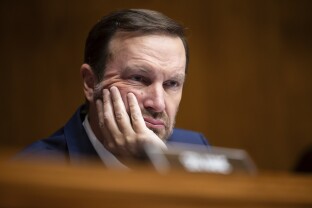Democrats emerged from the longest ever government shutdown with virtually nothing to show for it — at least in terms of health care.
That’s a messaging conundrum for a party that’s still reeling from 2024 losses, and that swore to voters that they would not fold without tangible concessions on health care from Republicans.
“It doesn’t help us,” Rep. Pramila Jayapal told NOTUS in a brief interview. “I don’t think it helps us, because we’re not delivering a victory.”
“And for the people that say, you know, ‘We won the messaging war’ — to me, part of the problem is we think about things in terms of messaging and not in terms of results,” Jayapal added. “We need both.”
Sen. Chris Murphy, like many Senate Democrats, lambasted the break in party strategy. He was among those who’d hoped the caucus would hold out for further GOP concessions, especially in the wake of Democratic wins in elections in New Jersey and Virginia earlier this month.
“This has happened over and over,” Murphy said. “You cannot defend democracy effectively if you are not united as an opposition party, and we are repeatedly showing that we are not united. So my hope is that the caucus comes together and decides to stop breaking apart like this.”
The issue at hand for Democrats is that none of the eight senators who voted for the deal will face any potential political fallout in the near future. None are up for reelection; two whose terms are ending are opting for retirement instead. But Democrats who are up in front of voters next year will have to answer for their hold out on reopening the government, as they demanded a deal that was not made.
To hear many Democrats tell it, that situation isn’t that dire. They just need to explain that they tried given the leverage that they had — and, if that doesn’t work, they can throw Democrats who did vote for the deal under the bus.
“With respect to the senators on the other side of the Capitol, they’re going to have to explain themselves,” House Minority Leader Hakeem Jeffries said when asked how the collapse in party unity will affect 2026 messaging.
Rep. Emanuel Cleaver told NOTUS the differing messages from Democrats on prioritizing opening the government versus health care come down to considerations they need to take for their states. He seemed to refer to Virginia Democratic Sen. Tim Kaine, one of the key votes for the measure to pass the Senate.
“It says that we have some members in the United States Senate who represent places like Virginia,” Cleaver said. “And it would be irresponsible for them to watch the pain of 200,000 people, their next door neighbors, people they sit in the pew with. And I think that is the conclusion they chose.”
House Minority Whip Katherine Clark defended the House Democratic Caucus’ position when asked specifically about the handful of Senate Democrats who negotiated the measure the House voted on Wednesday afternoon.
“I think that there is no division in our commitment to making sure we protect and deliver affordable health care for the American people. That’s the message of this Democratic Caucus,” Clark told NOTUS.
Others very clearly recognize their split comes across as disarray.
“People who are opposed to the deal need to be really clear and really loud and vocal, not just about being opposed to it, but about meeting the kind of leadership that gets us to a different place,” said Leah Greenberg, co-executive director at the progressive group Indivisible.
Still, Greenberg acknowledged “that for every retiring senator who voted for this, there was probably somebody else who was quietly backing it but doesn’t want to explain that to voters in the next election cycle.”
To be sure, the midterms are a year away. And at least two more rounds of government funding will occur before then: one when government funding runs out again in January and another at the end of the next fiscal year. Democrats argue those are other opportunities to hold Republicans accountable if they do not deliver.
Democrats are also still hopeful that the guarantee from Senate GOP leadership for a vote on a health care bill in December could be fruitful. There are active talks between Republicans and Democrats on compromise legislation, though the exact parameters are still unclear. Speaker Mike Johnson has declined to say whether he’d permit a similar vote in the House, and there’s no telling whether the White House would be on board, either.
But the length of this government shutdown means it will likely break through with voters as candidates head into the peak of campaign season. That would only be worsened if Democrats’ messaging continues to be mixed, at best.
“We have a lot of mixed messages we send because people do different things,” Rep. Steny Hoyer, who used to be in House Democratic leadership, told NOTUS.
He added: “But I think the message has been clear now for a very long period of time, we have to take care of opening up the government, and we have to take care of people’s health care.”
Sign in
Log into your free account with your email. Don’t have one?
Check your email for a one-time code.
We sent a 4-digit code to . Enter the pin to confirm your account.
New code will be available in 1:00
Let’s try this again.
We encountered an error with the passcode sent to . Please reenter your email.


